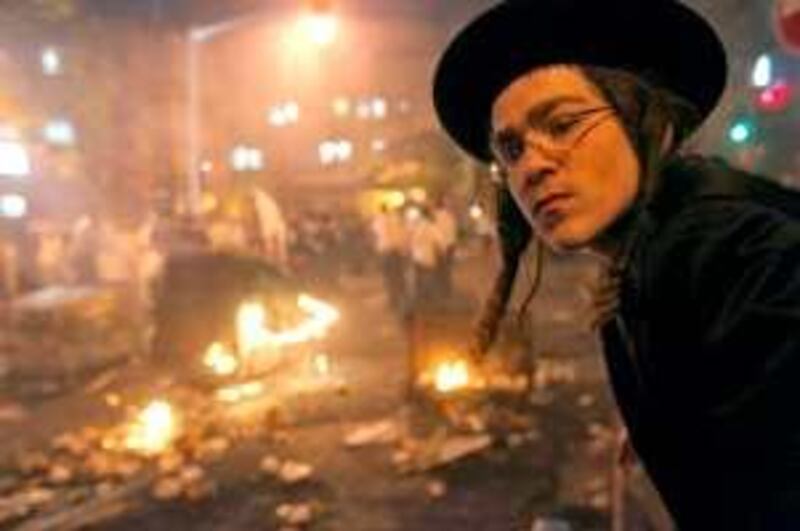TEL AVIV // Ultra-Orthodox Jews in Jerusalem are preparing for a second consecutive weekend of protests against the opening of a public car park they view as a violation of Jewish law, stepping up a battle that exposes the deepening rift between the disputed holy city's religious and secular Israelis.
Thousands of ultra-Orthodox Jews are expected to stage demonstrations and mass street prayer sessions today and tomorrow in a bid to reverse a recent decision by Jerusalem's secular mayor, Nir Barkat, to open the 850-spot municipal lot on the Jewish sabbath. The protesters are blasting the municipality's initiative as encouraging more Israelis to break Jewish law by driving on the sabbath and lending the religious breach an official stamp.
But the city claims the decision to open the lot a week ago was desperately needed to prevent rampant illegal parking by a growing number of tourists visiting Jerusalem in private vehicles on weekends. There is no public transportation in Israel on the sabbath, which is observed from sundown Friday until Saturday evening. The underground lot, located beneath city hall, is one of the only publicly run parking areas open on Saturday and is the closest one to the Old City's sacred sites.
The dispute represents the first major test for Mr Barkat, a self-made millionaire who was widely touted as the saviour of Jerusalem's dwindling secular Jewish community when he was elected to office in November. "This is Barkat's first conflict as mayor," said Yair Sheleg, a researcher at the Jerusalem-based Israel Democracy Institute and a columnist at Haaretz, a liberal Israeli newspaper. "He was elected as a secular messiah for the city and if he surrenders to the ultra-Orthodox, he will be considered a false messiah."
However, the ultra-Orthodox are not planning to give in easily. Last Saturday, hundreds of men, wearing their traditional black robes, rioted near the car park and threw stones, bottles and even used nappies, prompting police to fire water cannons and arrest at least five of them. Secular Jerusalemites are planning a backlash as they urge Mr Barkat not to give in and shut the parking area. Several groups have joined forces to organise rallies that are also set for today and tomorrow, mobilising musicians and liberal local politicians to take part and distributing T-shirts with the slogan "Jerusalem is also mine".
Michal Margulis, a spokeswoman for Jerusalem's Hebrew University student union, which is arranging the rallies, said the fight to keep the car park open is part of an effort to maintain the "delicate balance" between Jerusalem's Jewish groups. She added: "It is important to keep the city accessible to the secular public as well. It is pretty clear that the ultra-Orthodox leaders view this as a battle for the Jewish character of Jerusalem. But there is also a secular community that does not adhere to sabbath rules and that is fighting to stay here."
Indeed, many among Jerusalem's secular population claim the ultra-Orthodox want to impose on them ancient religious laws that forbid driving or working on the sabbath. Such strained relations between the two groups have spurred many young, secular and educated residents to leave Jerusalem, dealing a blow to the economy of the city that has become one of Israel's poorest. Ultra-Orthodox Jews, who follow a strict dress code and dedicate themselves to the study of holy texts, make up about one-fifth of the city's population. Their confrontation with nonobservant Jews over Jerusalem's Jewish identity typically draws less international attention than the conflict between Israelis and Palestinians over control of the city that Israel considers its capital, a status that is not recognised by the international community.
About 260,000 Palestinians live in East Jerusalem, territory Israel captured in the 1967 war and later annexed in a move not accepted internationally. Palestinians view East Jerusalem as the capital of their future state that they want in the Gaza Strip and occupied West Bank. The clashes over the car park appear to stretch beyond secular-religious tensions, also reflecting a struggle among forces within the ultra-Orthodox community itself.
Mr Sheleg of the Israel Democracy Institute said a tiny and extremist minority of the community that had no representatives on the city council was behind the protests and seeking to hurt the image of the more moderate ultra-Orthodox factions whose members account for more than a third of Mr Barkat's ruling coalition. Indeed, Mr Barkat is understood to have reached a pact with his ultra-Orthodox coalition allies that the car park would not charge fees from visitors and would be operated by a non-Jew in order to adhere to religious prohibitions on working or handling business transactions on the sabbath.
"The extremist group wants to embarrass the more moderate ultra-Orthodox factions by showing that the latter is co-operating with breaking sabbath laws," Mr Sheleg said. vbekker@thenational.ae





